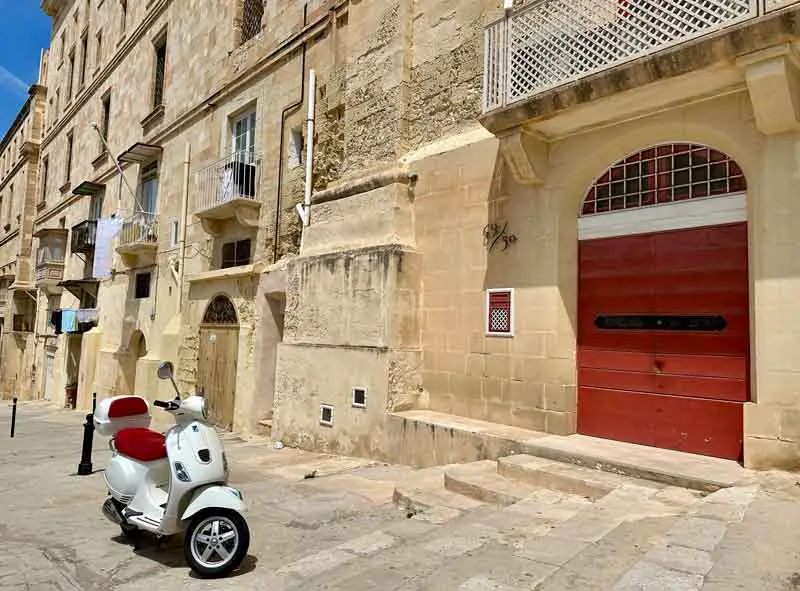Recently, we had the pleasure of spending one day in Valletta, the charming capital and seaport of the Mediterranean island of Malta. The fortified city of Valletta is situated on the eastern coast of Malta facing southern Sicily and is known for its rich history, stunning architecture, and relaxed atmosphere.
In one day in Valletta, we discovered a place suspended in time, steeped in history, yet blended with the present. From the modern Valletta Gate to ancient cobblestone streets lined with honey-toned buildings and balcony windows, traditional canon firing and the striking St John’s Co-Cathedral.
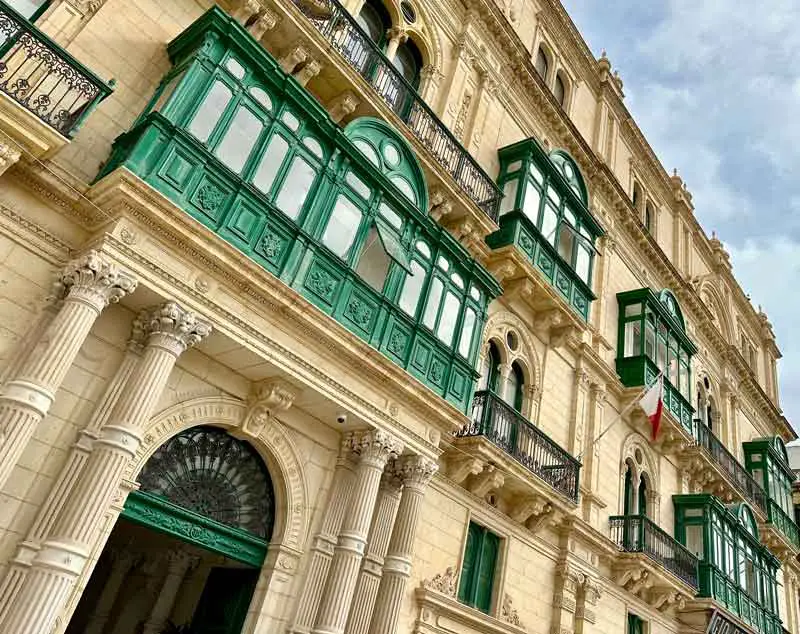
A visit to the enchanting city of Valletta is a chance to explore, discover, and embrace its true essence. Valletta is certainly a city that offers authentic moments over extravagant costs. So, in this article, we share with you our walking itinerary for one day in Valletta with hidden gems and enriching local experiences that will create priceless memories without breaking the bank.
One Day in Valletta Itinerary
Valletta is a UNESCO World Heritage Site and one of the most concentrated historic areas in the world with 320 monuments within 55 hectares (or 103 football fields). Although we couldn’t possibly visit all these places in one day, we managed to see a lot!
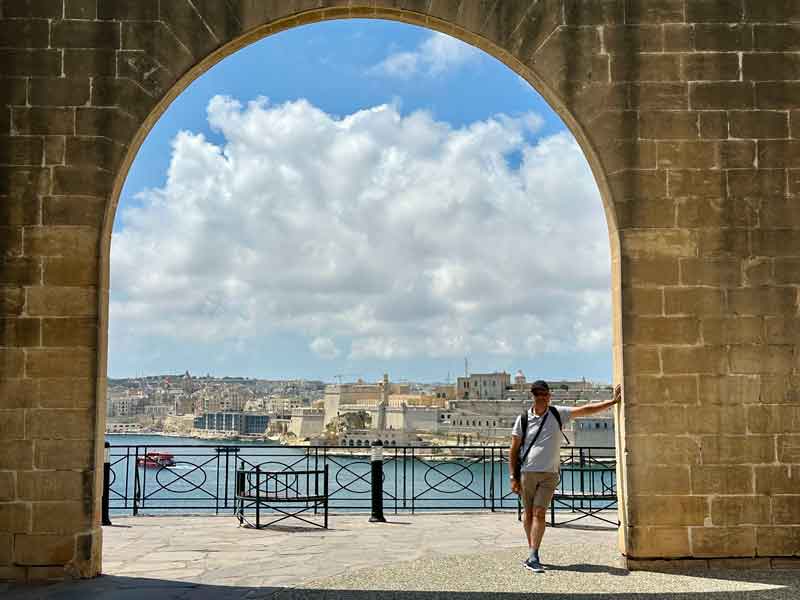
It also helped that the streets of Valletta are set out in a grid layout making it easy to navigate the city on foot and discover its interesting landmarks. To help you make the most of your visit, here is our one day in Valletta itinerary.
1. Valletta Cruise Port and Valletta Waterfront (Pinto Stores)
Our one day in Valletta started at Valletta Cruise Port on the Valletta Waterfront as Valletta happened to be the fourth destination on our MSC World Europa cruise.

One of the first things to see are the 19 Pinto Stores of the Valletta Waterfront. These were originally built in 1752 but have been completely restored.
Historically, these Baroque warehouses stored exports of silk, dried fruits and olive oil and imports of food and arms. Today, the historic Valletta Waterfront is a picturesque setting for food, shopping, and entertainment.
How Do I Get from Valletta Cruise Port to City Centre?
There are two main ways to reach the fortified city centre of Valletta from Valletta Cruise Port:
- Barrakka Lift from the harbour to Upper Barrakka Gardens.
- Valletta City Gate into Republic Road.
Most people are advised to walk along the Pinto Wharf and Lascaris Wharf and take the Barrakka Lift to directly access Valletta via the Upper Barrakka Gardens. However, we decided it would be more authentic to enter the capital through the Valletta City Gate.
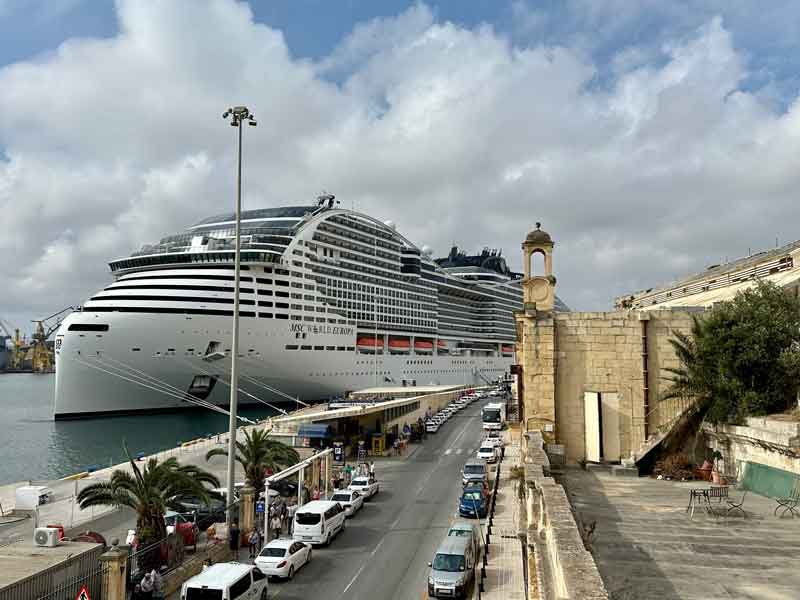
To find the Valletta City Gate from the cruise port, take a sharp left turn uphill at the end of the Pinto Wharf. It feels like you are walking back on yourself, but that’s OK. Keep following the road (It-Telgha tal-Kurcifiss) until you see some steps on the right. Climb the steps for a short cut!
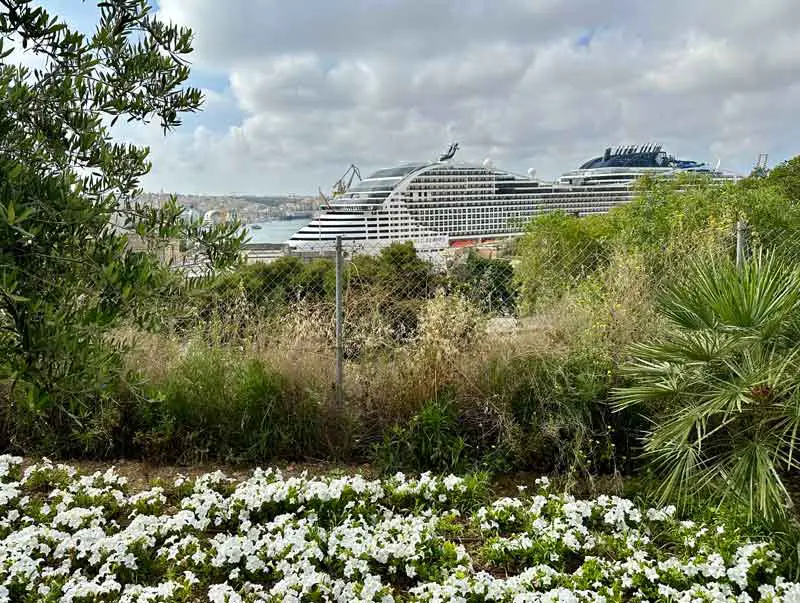
The steps go past a hospital and lead you to some gardens (Herbert Ganado Gardens). Walk through the gardens, cross the main road and head towards the bus terminal. Here you will find the Triton Fountain and the Valletta City Gate.
2. Triton Fountain, Valletta
Next to the bustling Valletta bus terminal and just outside the Valletta City Gate is the Triton Fountain. This fountain features three bronze mythological Tritons (Gods of the sea) which look towards the entrance of the city.
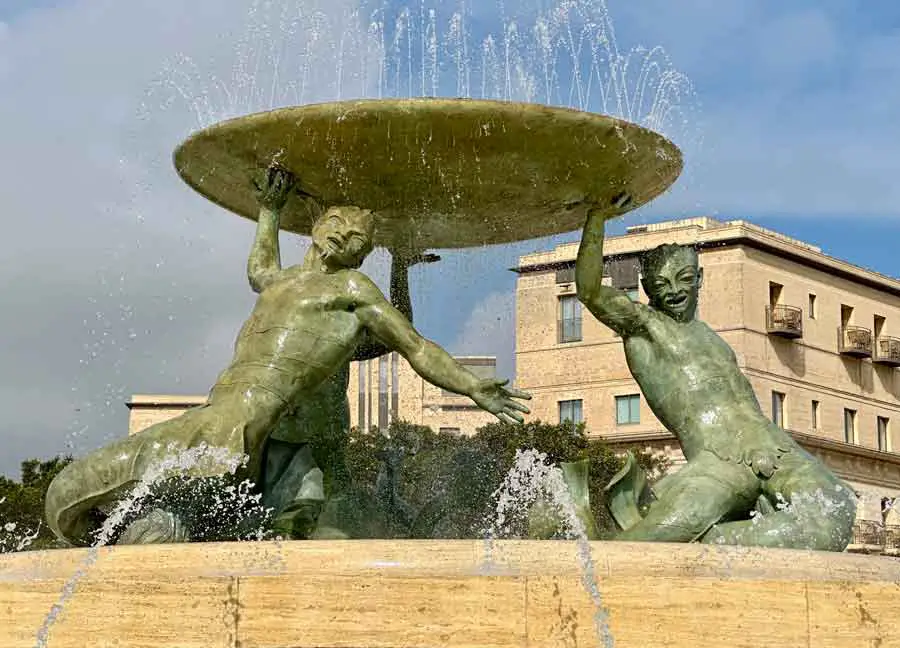
3. Valletta City Gate
Valletta City Gate was one of three gates that originally led into the city of Valletta. Entering Valletta via the City Gate transported us back in time and gave us a real sense of the fortified nature of the city. Before entering the city itself, we could appreciate the original curtain wall and ditch that once protected Valletta.
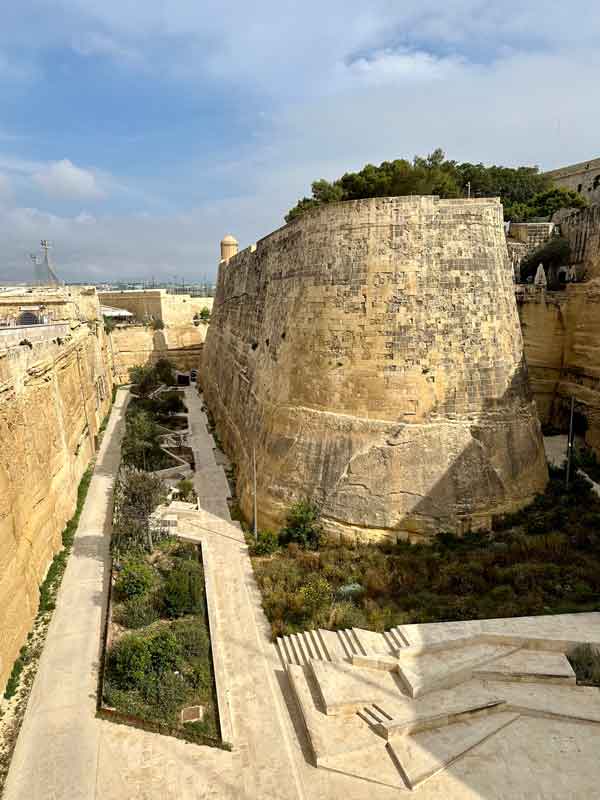
After we crossed Valletta’s City Gate Bridge, we came face-to-face with the fifth and present City Gate designed by Renzo Piano. Today’s modern gate into Valletta is a narrow opening in the bastions with imposing large stone blocks separated from the curtain walls by high steel blades.
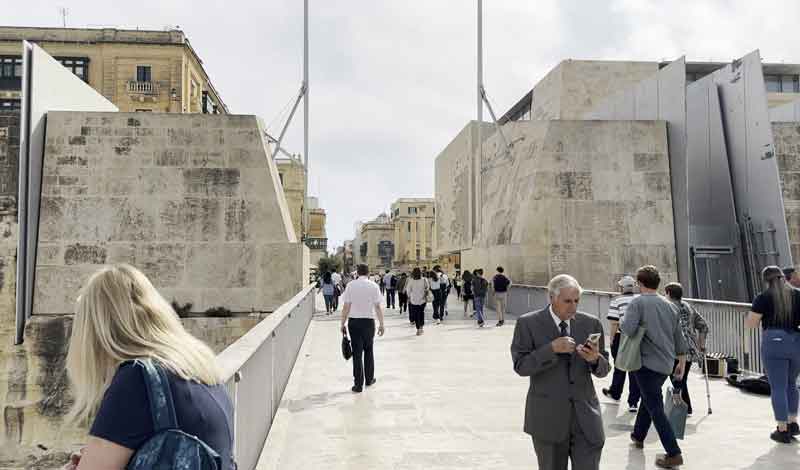
The Valletta City Gate not only marks the entrance to the capital, but it is also the beginning of the city’s main street called Republic Street (Triq ir-Repubblika). We felt that this was a great place to start exploring the city, plus the Parliament House and remains of the Royal Opera House are also nearby.
4. St John’s Co-Cathedral, Valletta
Visiting St John’s Co-Cathedral in Valletta was the only landmark we paid to enter, and we were glad we did! Don’t miss out on this remarkable experience. We couldn’t believe what awaited us inside St John’s Co-Cathedral from its unremarkable exterior façade!
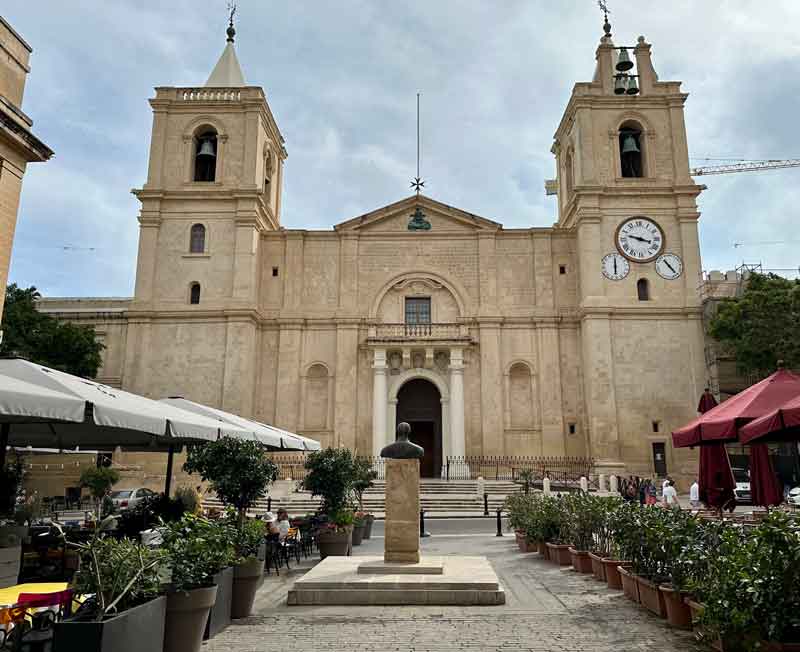
This extraordinary church was built by the Order of the Knights of St John and was completed in 1577. The interior is a breath-taking masterpiece of Baroque art and architecture that will take your breath away.
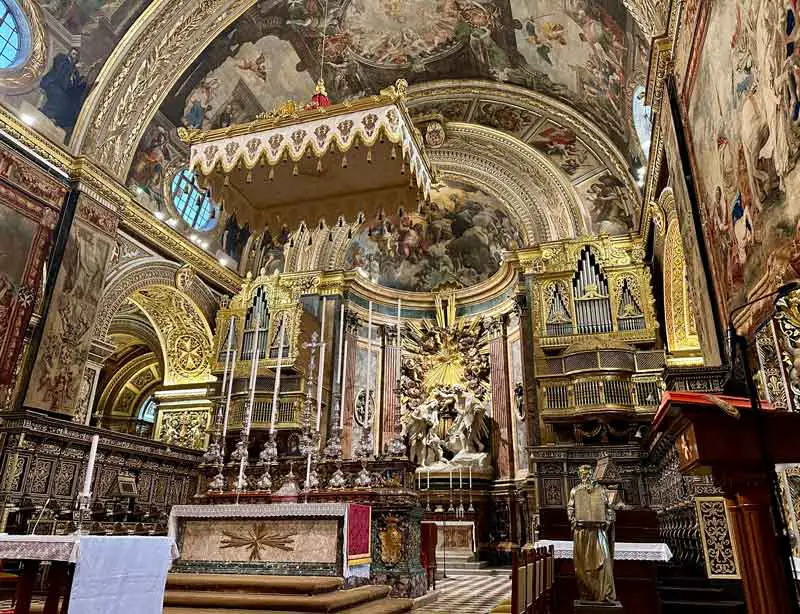
The cathedral’s ornate design features intricately detailed frescoes, gilded columns, and a stunning marble floor adorned with over 400 tombstones of the Knights of St. John, creating a rich and awe-inspiring visual experience. You really need to see it to believe it!
5. St George’s Square or Palace Square, Valletta
Just off Republic Street and in front of the Grandmaster’s Palace is St George’s Square that is also known as Palace Square. This 17th century square is the largest square in Valletta and is known as the heart of the capital.
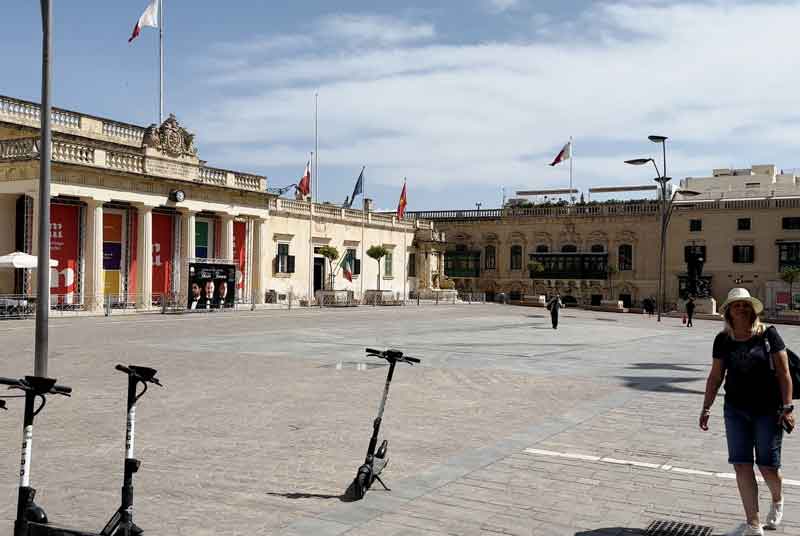
St George’s Square has witnessed many historic events including the presentation of the George Cross in 1942. We even found a small plaque from Buckingham Palace on the wall commemorating this event!
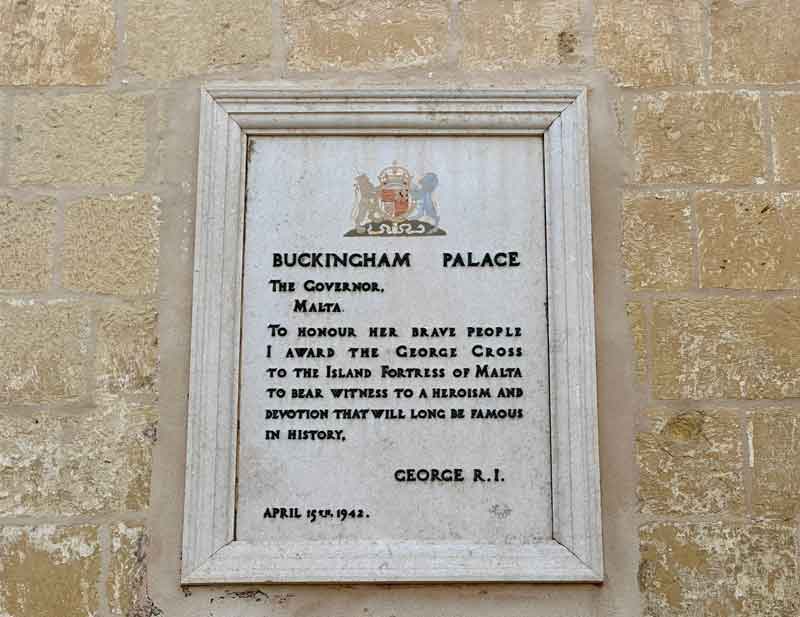
Although the Grandmaster’s Palace was still closed for restoration work at the time of our visit, we could still admire its exterior façade and other grandiose buildings on the square. These included the Casa Dei Conti (the Order of St John’s treasury), the Main Guard Building, and the Hostel de Verdelin (formerly a palace, but now a police station).
6. Archbishop Street & Merchants Street, Valletta
One of the great things we enjoyed about Valletta was exploring its many limestone streets without a plan and discovering new things for ourselves.
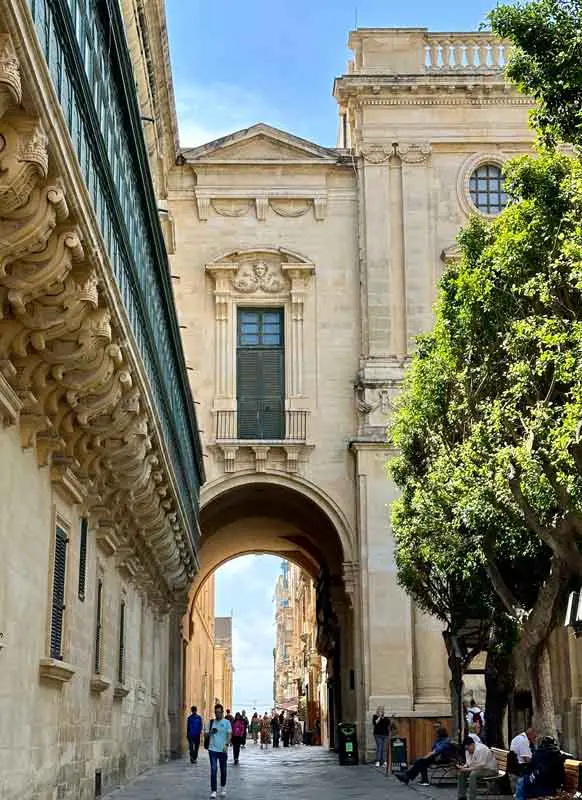
After St George’s Square, we walked along Archbishop Street (Triq L’Arcisqof) and stumbled upon the Greek Catholic Church Our Lady of Damascus. This unusual church was destroyed during bombing in World War II but has been completely reconstructed. Not only was this church interesting to visit, but we were also given a friendly welcome by the housekeeper.
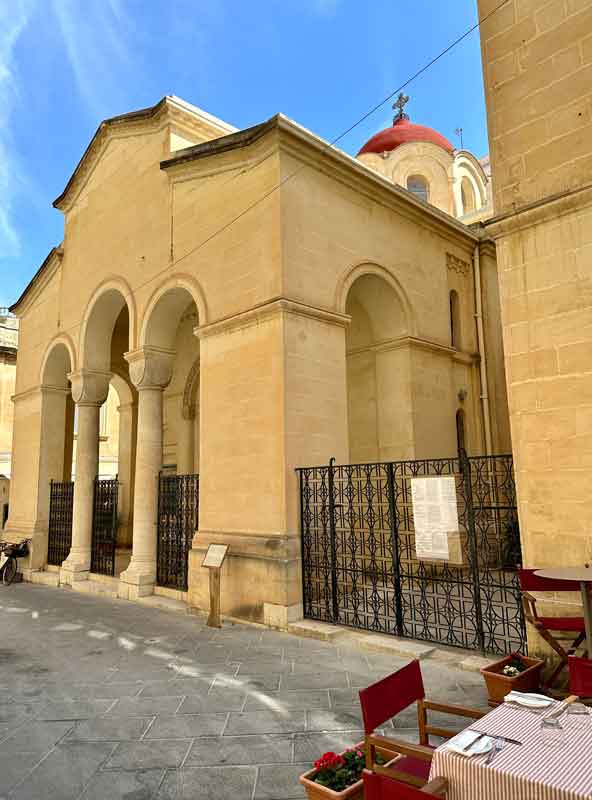
We then decided to follow the length of Merchants Street (Trik Il Merkanti) until we reached St Elmo Place at the easterly tip of Valletta (Sceberras peninsula). En route, we discovered many more churches and took time to enjoy the architecture and peaceful atmosphere around us.
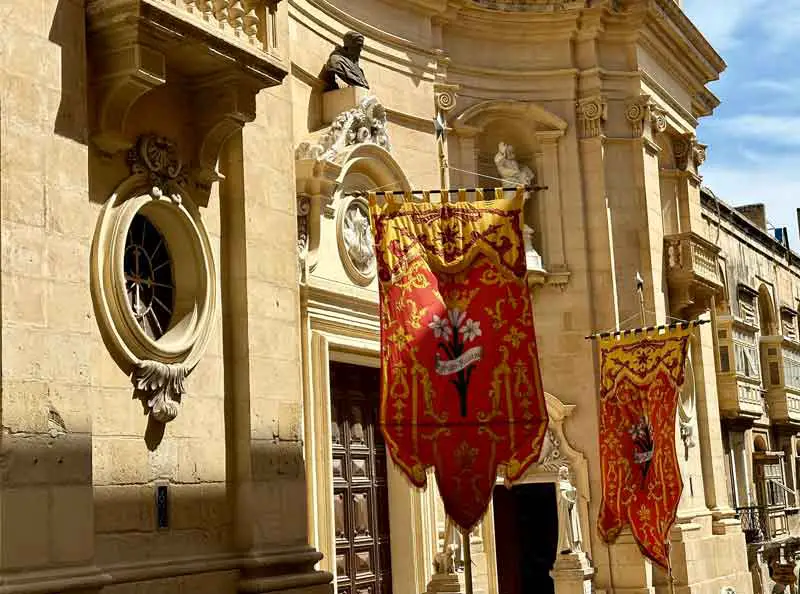
7. Fort St Elmo – National War Museum in Valletta
At the far end of Valletta, we found the entrance to Fort St Elmo. Fort St Elmos is a star-shaped fort that was built in 1552 in a strategic location at the tip of the Sceberras peninsula of Valletta.
Personally, we did not pay to visit the grounds or museum of Fort St Elmo, as we wanted to continue exploring the streets of Valletta. Instead, we found a nearby path (situated after The Malta Experience) that walks around the perimeter of the outer walls of Fort St Elmo.
8. Wuestenwinds Beach, Valletta
Beneath the main road near Fort St Elmo, we discovered an unexpected hidden gem. Tucked away from sight, we found a concealed stone beach known as Wuestenwinds Beach that was lined with traditional fishermen’s houses.
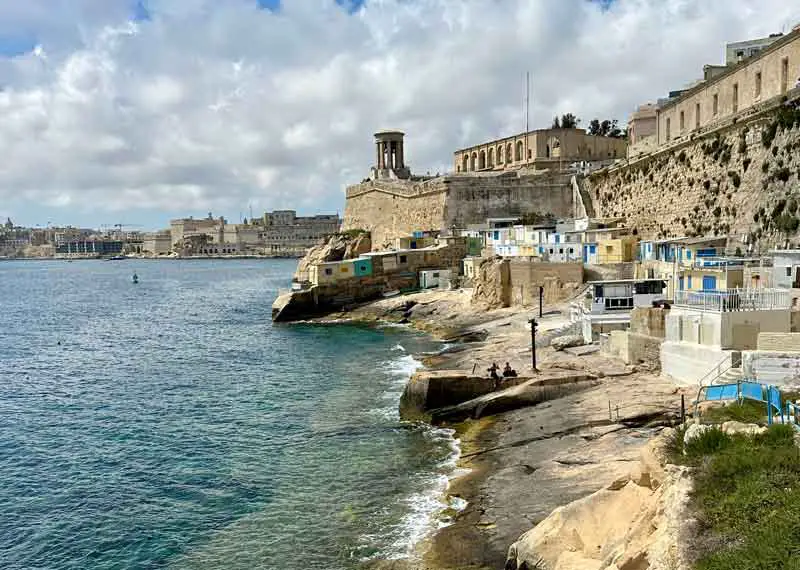
This location was a great find as we were not aware that Valletta even had a beach and it appeared that only a few locals knew about it and were cooling off here. From Wuestenwinds Beach, we also enjoyed a great view of the Siege Bell War Memorial above us.
After taking time to enjoy this spot, we continued following the path along the rocky platform through the Fishermen’s Village, then headed up the stairs to visit the Siege Bell War Memorial and Lower Barrakka Gardens.
9. Siege Bell War Memorial, Valletta
The Siege Bell War Memorial is a moving memorial to remember those who died defending Malta during the siege in World War II.
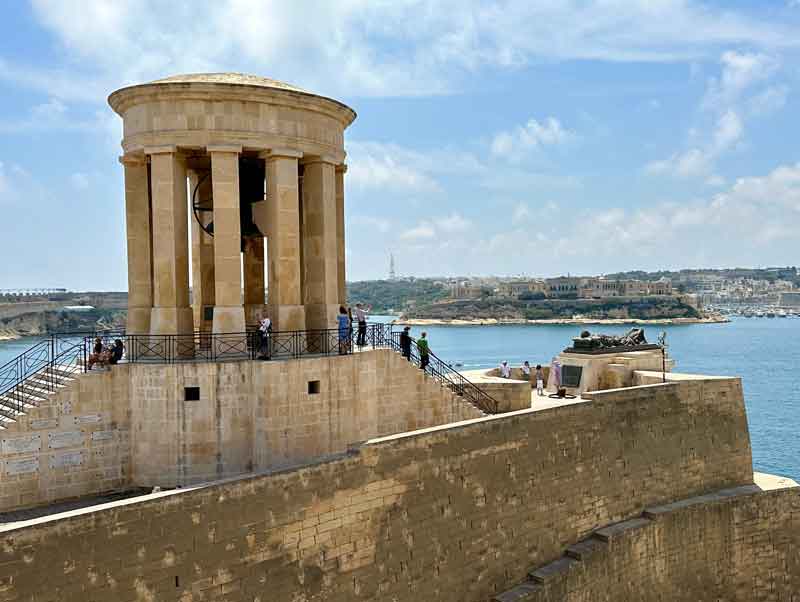
It is worth climbing the flights of steps to get close to the huge, imposing bell that hangs within a domed rotunda surrounded by pillars. At the foot of the rotunda is also a poignant bronze statue facing the entrance of the Grand Harbour dedicated to the ‘Unknown Soldier’.
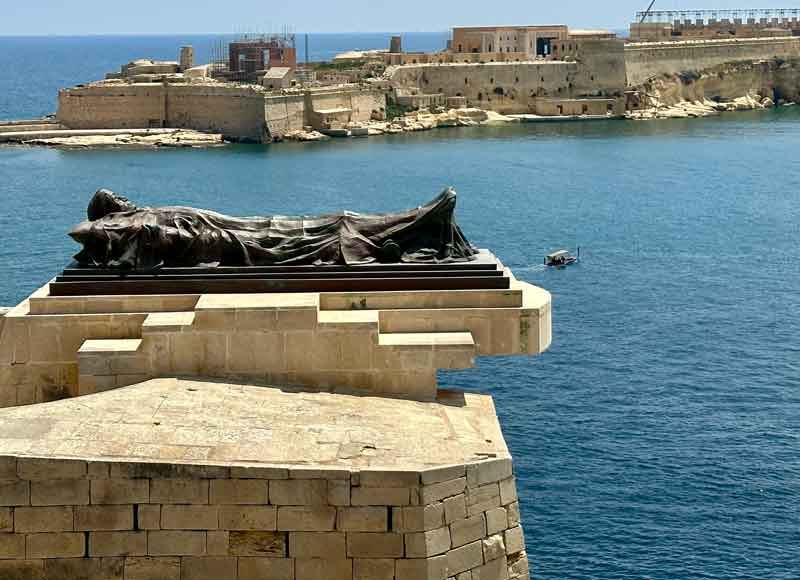
From the Siege Bell War Memorial, there are also fantastic views over the Grand Harbour and it’s a great place to watch the traditional fishing boats or luzzu in the water below.
10. Lower Barrakka Gardens, Valletta
Above the Siege Bell War Memorial on top of the St Christopher Bastion are the Lower Barrakka Gardens. We thought this was a very peaceful and beautiful spot where locals relax side-by-side with tourists and travellers.
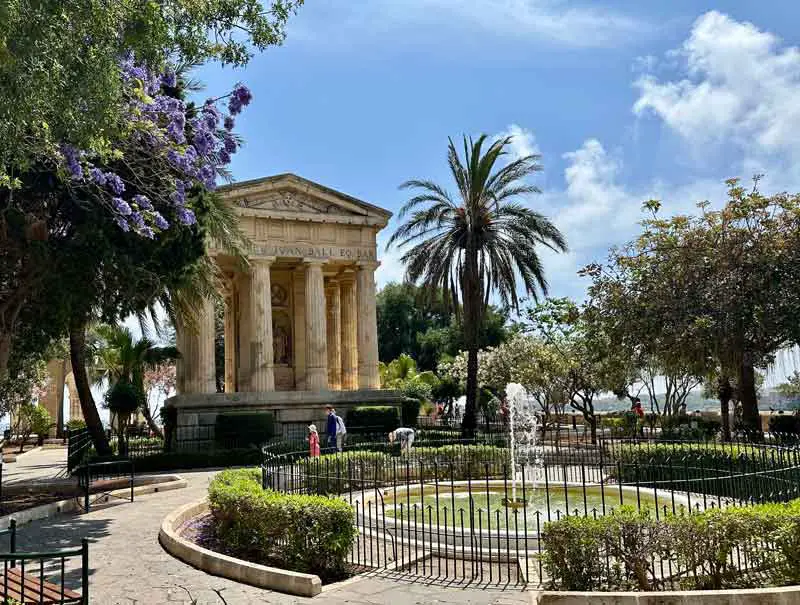
Lower Barrakka Gardens are also a good place to find some shade during the heat of the day and to enjoy the views over the harbour from one of the many benches.
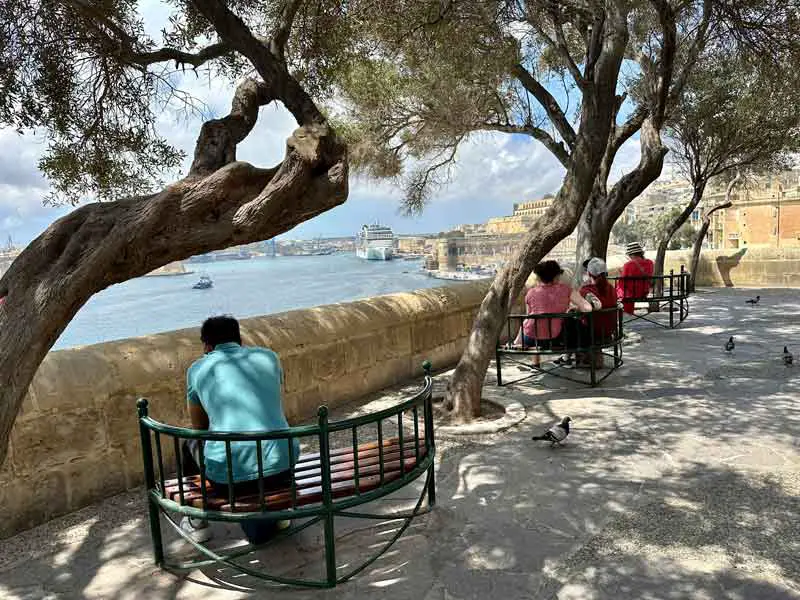
If you are into photography, you can also take some great shots of the Siege Bell War Memorial and Valletta harbour through the arches that surround part of the gardens.
12. Victoria Gate, Valletta
At the end of the St Barbara Bastion is the Victoria Gate. Built during British rule in 1885, the Victoria Gate is the city’s last remaining historical gate, so we thought it was worth a quick detour.
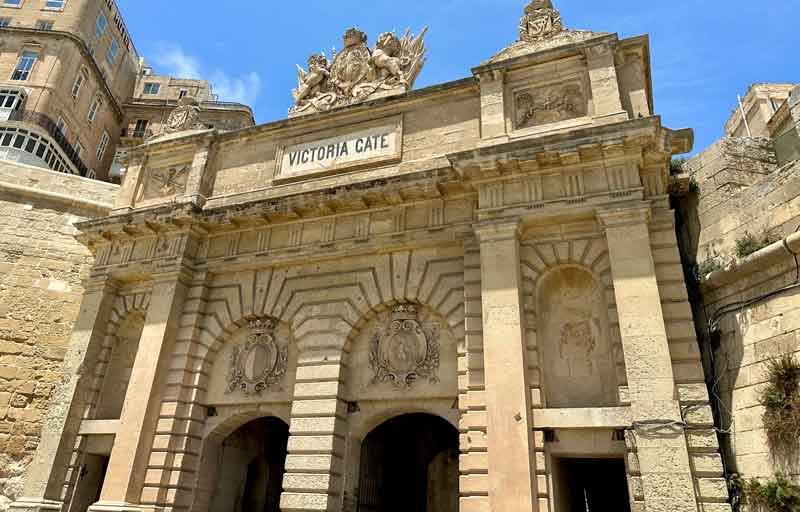
The Victoria Gate has ornate architecture and remains an impressive gateway entrance to the city from the harbour area. Mind the traffic when you are visiting the Victoria Gate as it is very busy in this area!
13. Upper Barrakka Gardens, Valletta
To reach the Upper Barrakka Gardens from the Victoria Gate, we headed up Battery Street (Triq Il-Batterija) and really enjoyed the architecture along the way.
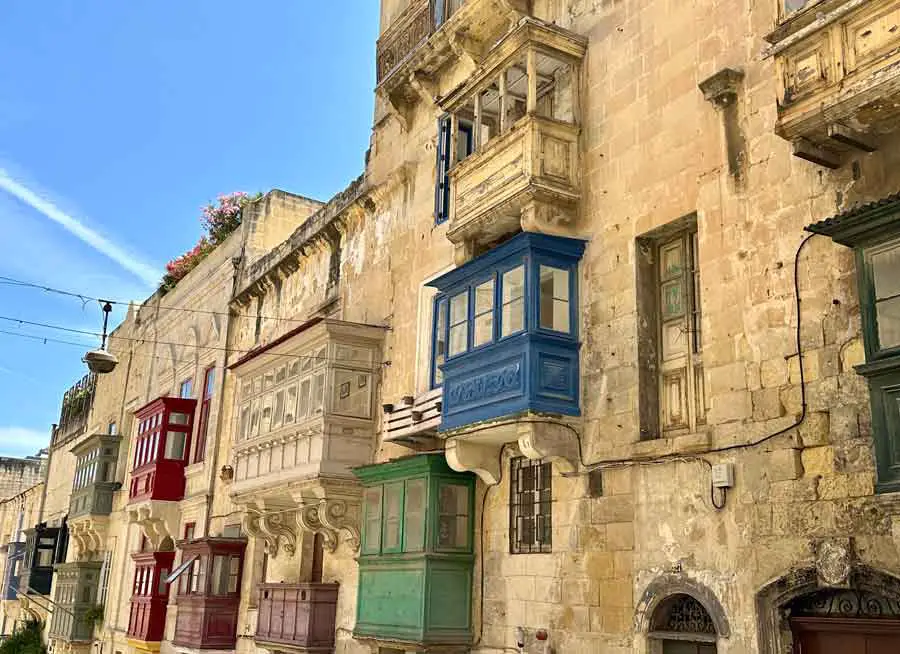
Built in 1560, the Upper Barraka Gardens are public gardens located on the upper level of Saint Peter and Paul Bastion. Although we thought the gardens were less attractive than the Lower Barrakka gardens, they offer another great panoramic view of the Grand Harbour.
In addition, the balcony towards the back of the Upper Barrakka Gardens overlooks the Saluting Battery. This is a popular place to watch the daily firing of the canons for free, so it gets very crowded. Our advice is to arrive at least 30 minutes before the noon start time to secure a good spot.
14. Saluting Battery, Valletta
Valletta’s historic Saluting Battery was constructed by the Order of St John in 1566 on one of the best vantage points overlooking the Grand Harbour. Each day at noon, history is re-enacted through a traditional canon-firing ceremony at midday.
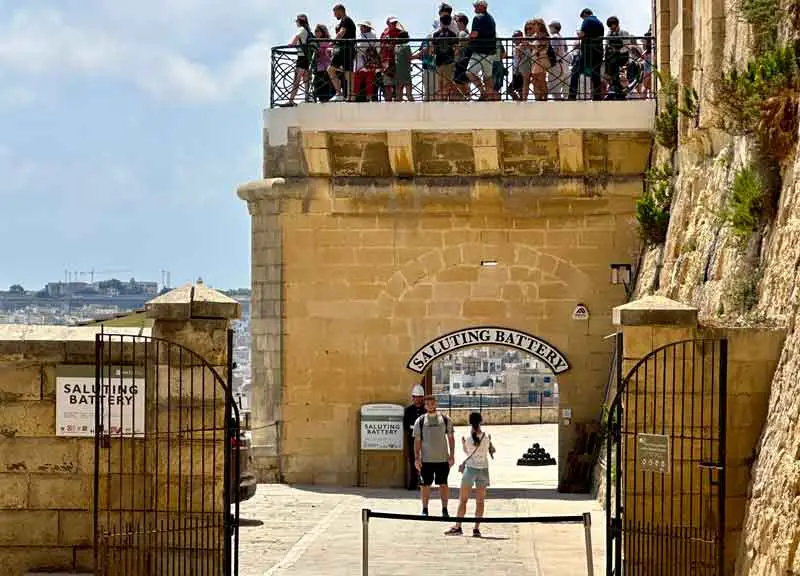
This unique experience certainly transported us to another time. The firing of the canons was truly impressive with lots of pomp and ceremony from the uniformed guards. It was a great spectacle to witness and really brought a moment from history to life in front of our eyes.
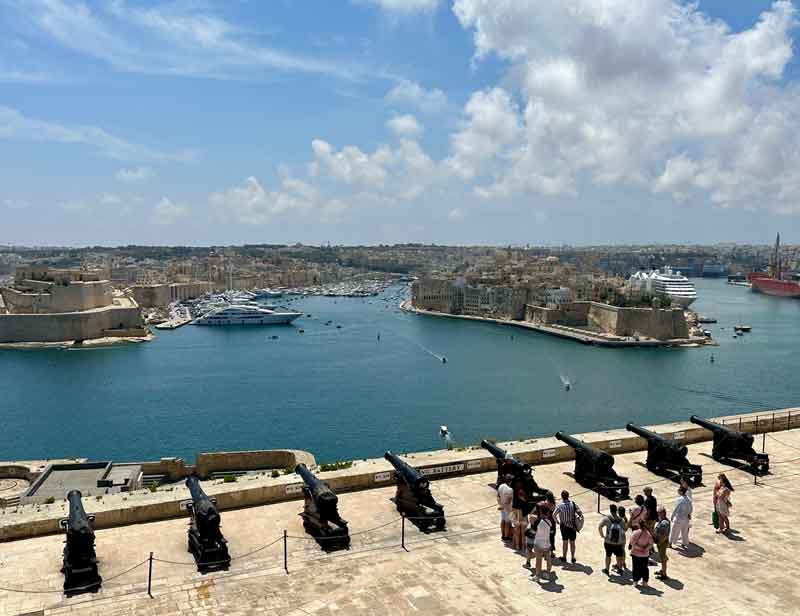
If you are interested in military history, you can pay to visit the Malta at War Museum in the Saluting Battery and to visit the War HQ Tunnels. The small fee for the museum also allows you to watch the canons firing at closer proximity and to ask staff questions. Alternatively, you can watch the event for free (like us!) from the balcony of the Upper Barrakka Gardens.
15. Barrakka Lift, Valletta
The Barrakka Lift links the Grand Harbour to the Upper Barrakka Gardens and Valletta city centre.
Although we didn’t use the Barrakka Lift, it is the quickest way into the city from the Valletta waterfront and is great for anyone with reduced mobility.
Final Thoughts on our One Day in Valletta
Valletta’s undeniable charm lies in its seamless blend of old and new and its pleasant easy-going vibe. Beyond its captivating history, the city had many free things to see and do that provided us with authentic moments and experiences. Our one day in Valletta itinerary has left us with unforgettable memories of a day well spent and a reminder that genuine experiences need not come with a price tag.

